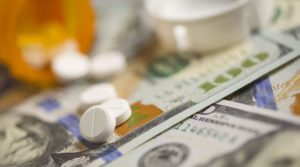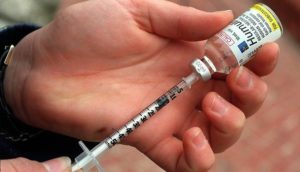- Martin Shkreli’s new jailhouse home is ‘not where you want to be’: Defense lawyer (cnbc.com)
Shkreli is expected to be locked up...for four months...Martin Shkreli's new home in a Brooklyn, New York, federal jail is definitely not the kind of place "where you want to be,"…Metropolitan Detention Center Brooklyn...Shkreli...was thrown into the MDC...after a Brooklyn federal court judge revoked his $5 million release bond...Judge Kiyo Matsumoto ruled that Shkreli represented a danger to the community because of a bizarre $5,000 bounty he offered to Facebook followers who grabbed samples of Hillary Clinton's hair for him...Shkreli, who previously ran two pharmaceutical companies and several hedge funds...A jury convicted him in August of three securities fraud charges...
- How AI Is Transforming Drug Creation (wsj.com)
Pharmaceutical companies hope computers can help them find new medications that are faster, cheaper—and more likely to be effective...The idea is that machines, which are adept at pattern recognition, can sift through vast amounts of new and existing genetic, metabolic and clinical information to unravel the complex biological networks that underpin diseases. That, in turn, can help identify medications likely to work in specific patient populations, while simultaneously steering companies away from drugs that are likely to fail...In the past, drug companies have used artificial intelligence to examine chemistry—whether a drug might bind to a particular protein, for instance. But now the trend is to use AI to probe biological systems to get clues about how a drug might affect a patient’s cells or tissues...Biological insights driven by machine learning also could help pharmaceutical companies better identify and recruit patients for clinical trials of therapies most likely to work for them, perhaps boosting the chances of those medications’ getting approved by regulatory agencies...The big difference between AI-driven drug trials and traditional ones...is "we’re not making any hypotheses up front. We’re not allowing [human] hypotheses to generate data. We’re using the patient-derived data to generate hypotheses."
- Merck, UnitedHealth explore improving value-based contracts (biopharmadive.com)
As value-based contracts gain increasing traction in the healthcare system, Merck and UnitedHealth are teaming up to investigate exactly what makes those deals tick and how to improve them...the duo announced a multiyear project under which they will use patient information collected by the UnitedHealth's Optum...to create and test pay-for-performance models. The goal is to explore such models' "potential for broad adoption among health insurance companies, pharmacy benefit managers and pharmaceutical companies,"...The premise of outcome-based deals is that payers or PBMs offer rebates and discounts to drugmakers depending on how well a medication helps patients — more if the health benefit is high, less if it's low. In essence, these are compromises between the former parties, which want to pay as little as possible for a drug, and medicine developers, which want coverage and formulary inclusion for their products...
- R&D Costs For Pharmaceutical Companies Do Not Explain Elevated US Drug Prices (healthaffairs.org)
That pharmaceutical companies charge much more for their drugs in the United States than they do in other Western countries has contributed to public and political distrust of their pricing practices. When these higher US prices...are challenged, the pharmaceutical industry often explains that the higher prices they charge in the US provide them with the funds they need to conduct their high-risk research...This claim—that premiums earned from charging US patients and taxpayers more for medications than other Western countries funds companies’ research—is empirically testable...We found...charging substantially higher prices...in the US compared to other Western countries generates substantially more than the companies spend globally on their research and development...Importantly, our analysis cannot inform the question whether or not it is appropriate for US patients, taxpayers, and businesses to bear the burden of funding pharmaceutical research for the world...
- 5 Trends influencing drug pricing (biopharmadive.com)
It started the same way many things have in recent memory, with a tweet...Hillary Clinton’s...Twitter account..."Price gouging like this in the specialty drug market is outrageous. Tomorrow I'll lay out a plan to take it on."...Recognizing the risks that such reforms would pose to drugmaker revenue, investors quickly sold off millions of shares in pharmaceutical companies. The iShares Nasdaq Biotechnology exchange-traded fund, which shows levels of biotech investments, sunk more than 6%…the biopharma industry could see just how much was at stake if it left pricing backlash unchecked. Still, the problem persisted...In response to the pushback, drugmakers have adopted a few key strategies...reactions to those initiatives have been mixed at best, with many viewing them as skin-deep remedies rather than the panacea needed to substantively solve drug pricing. Though a cure-all isn’t on the horizon, five key trends are currently shaping drug pricing decisions:
- Targeted legislation
- New models
- Rare disease and specialty drug development
- Negotiating power
- High-deductible insurance plans
- Working Smarter: Establishing an Effective Serialization Architecture (pharmtech.com)Serialization and the Drug Quality & Security Act (pharmamanufacturing.com)
The upcoming serialization requirements in the European Union and the United States have presented pharmaceutical companies with the challenge of balancing data integrity with performance when designing the appropriate information architecture...The pharma sector is currently undergoing the process of introducing new systems and processes for serialization...Companies offering networks for the storing and sharing of vast amounts of serialization data are challenged with creating a shareable world that is also scalable. For pharmaceutical companies, serialization will require a paradigm shift in IT architecture to deal with the combination of the vast amount of data stored within network databases and the operational processes associated with the upcoming requirements...In an industry as highly regulated and safety critical as the pharmaceutical sector, the integrity of the real world must meet the volume and performance of the virtual world. Cloud networks for serialization must offer security, together with speed and scalability especially with the introduction of new drug traceability requirements across the globe...
- Nevada Senate Passes Insulin-Price Bill Tough on Drugmakers (lasvegas.cbslocal.com)
A bid in Nevada to force America’s three insulin manufacturers to turn over information on the...prices of...hormone treatment for people with diabetes advanced with bipartisan support...The Democratic (Democrat) proposal has transitioned from a first-of-its-kind price control to a measure focused on pricing transparency...it retains what would be some of the toughest regulations on pharmaceutical companies in the nation...It would require drugmakers to annually publish the list prices they set and profits they make on insulin, as well as the total amount of insulin discounts they give market middlemen — specific data points currently largely kept confidential...Some pharmaceutical companies, including insulin-maker Sanofi SA, have voluntarily released recent data on their price increases...Market experts say transparency alone won’t lower patient costs...
- How do you get lower cost drugs? Give the FDA a bigger stick (thehill.com)
Regulation can be a tool to strengthen competition and address important health and safety concerns, but it can also be abused to limit access to the market...lawmakers and regulators must regulate wisely and be careful of unintended consequences...what happens when important safety regulations can be gamed by bad actors seeking to preserve their monopoly profits?...This has been happening in the market for generic drugs, where some dominant brand name pharmaceutical companies are trying to shut out low cost generic competitors by manipulating the regulations originally designed to keep people safe. And this is not a small problem, either…The problem comes from a conflict that arises between...Risk Evaluation and Mitigation Strategy, and the approval process a generic company needs to go through to enter the market once a drug patent expires. Generics must get a sample of the brand name drug they want to compete with to prove to the FDA that their product is exactly the same...the REMS program greatly restricts access of certain drugs unless proper safety protocols, unique to each drug, are met. This can leave generic companies with no choice but to ask for samples directly from the manufacturer...It is not surprising that these drug makers are denying generics access to these samples. However, the FDA currently does not have the tools necessary to discipline these bad actors and force the distribution of samples to generic companies...Congress is now paying attention...
- FDA moves to prevent Pharma from ‘gaming’ generic drug system (reuters.com)
The...Food and Drug Administration moved...to prevent pharmaceutical companies from "gaming" the system to block or delay entry of generic rivals…FDA Commissioner Scott Gottlieb said...that the agency plans to hold a public meeting...to identify ways pharmaceutical companies are using FDA rules to place obstacles in the way of generic competition..."We know that sometimes our regulatory rules might be 'gamed' in ways that may delay generic drug approvals beyond the time frame the law intended, in order to reduce competition,"..."We are actively looking at ways our rules are being used and, in some cases, misused."...These obstacles can include limiting the availability of branded products for testing by generic companies, or prolonging negotiations with generic companies over the implementation of shared risk-management programs...
- Biosimilars May Not Deliver Savings Due to Rebates on Biologics (managedhealthcareconnect.com)
A recent editorial published in JAMA explained that biosimilars may not deliver the savings payers and consumers had hoped as a consequence of large rebates negotiated by pharmacy benefit managers...The authors...suggested that due to something known as the "rebate trap,"—a flaw through which biosimilars are offered as low-tier options by payers and thus cost more money because reference products have larger negotiated rebates—biosimilars may fail to deliver significant cost savings...Biosimilars for chronic diseases, the largest category of biological therapies, are unlikely to yield widely expected cost savings...Rebate agreements between pharmaceutical companies, pharmacy benefit managers, and other payers create an incentive for payers to prefer more expensive branded biologics over biosimilars...










